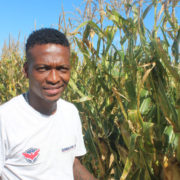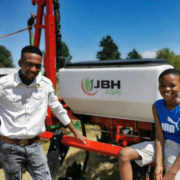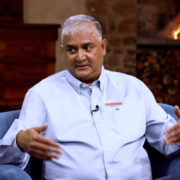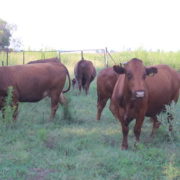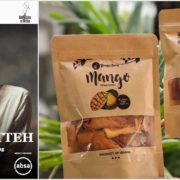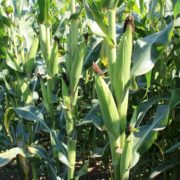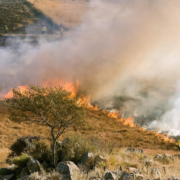White beans give rise to abundant harvest – African Farming
The value of learning about farming from a young age is inestimable, but unfortunately the policies of the past separated many potential farmers from the generational knowledge that should have been their birthright. Seitshiro Marumoloe was raised by his grandparents, who were small-scale farmers, and exposed to agriculture from his early childhood. He talks to Peter Mashala about his journey back to farming.
Seitshiro Marumoloe was raised by his astute and entrepreneurial grandparents who laid a solid foundation for him to become the successful businessman and farmer he is today. His grandfather and mentor Hendrik Segatle farmed maize and sunflowers on communal land at Springbokpan village, close to Mahikeng in the North West province. His grandmother Seatile ran the village’s only grocery store.
Today Seitshiro is a commercial farmer and the proud producer of white maize, small white canning beans and sunflowers, which he grows on his farm near Sannieshof and on communal land in Springbokpan. “I used my grandfather’s old tractor, which I still have, when I started farming,” he smiles.
BEANS SAVE THE DAY
He grows yellow maize (hybrid PAN 5R-582R), small white canning beans (PAN 123) and sunflowers (PAN 7100) in rotation on 400ha. This season he has planted 300ha to beans, and the remaining 100ha to maize. The beans are a relatively new venture that he started planting commercially in the 2018-2019 season. He says bean production saved his business at a time when things were really tough after three years of drought.
“My close friend Vuyani Lolwane, who has since passed away, introduced me to Kallie Schoeman of Schoeman Boerdery in Delmas, Mpumalanga. Kallie was Vuyani’s buyer at the time and he became my buyer,” Seitshiro explains.
He says producing beans is lucrative, provided one has the right equipment, the expertise and, most importantly, the market. He sells his beans on contract to Schoeman Boerdery, where they are cleaned, sorted and graded before they go to Tiger Brands for canning. Schoeman Boerdery processes the lower grade beans for animal feed.


BUSINESS FIRST
Despite a childhood spent with a farming grandfather, Seitshiro says it wasn’t until much later, when he was working for NWK, that he was drawn back to farming. “I knew I wanted to be in business, but farming wasn’t at the top of my list.”
His is a family of resourceful and enterprising business-people. Apart from his grandparents, his mom, Tshegofatso, and his dad, Moremogolo, also ran small businesses. “My mom bought a range of items, from blankets to kitchenware, in Johannesburg and sold them in Lichtenburg.” Seitshiro started his first business with his dad after finishing a course in business studies at Taletso TVET College in Lichtenburg in 2002.
“After writing matric at Alabama High School in Klerksdorp, I asked my parents to give me the money they would have spent on my university fees to start my own business,” he explains. “My mother agreed to give me the money they had saved for my fees on condition that I get a qualification as a backup in case the business failed.”
After completing a business diploma, Seitshiro started Fantabulous Tours in 2002. He bought two minibuses for his touring business, and ran trips to church gatherings, funerals and social trips, including crossborder trips to Botswana and Lesotho. In 2010 the business went through challenging times and profits declined to a point where Seitshiro had to look for work.
He found a job as a trainee silo operator and then an operator at the NWK’s Mareetsane branch. He was later promoted to silo manager before he moved to head office in Lichtenburg to work as a credit controller. A year later Seitshiro left NWK to take up a sales position at a car dealership in Lichtenburg.
“I had only been at the dealership for a few months when my former boss at NWK, Freddie Pohl, asked me to come back. NWK was about to launch its emerging grain farmer development programme and Freddie needed someone in his finance department to facilitate loans for black farmers,” he explains.
Seitshiro took the job, which meant he worked closely with other departments like agri-services, insurance and fertiliser. At the time, he had moved back in with his grandparents. At this stage they were old and frail and needed care.
“I was commuting between Springbokpan and Lichtenburg every day. In the morning when I left, I would see my grandfather’s tractors and implements sitting there because he was no longer farming.” The more he interacted with farmers and attended farmers’ days, the more he remembered the time he had helped his grandfather on the farm. “One day I decided to fix the tractors and try farming on a small scale, starting on my grandfather’s 10ha plot.”


SOWING THE FIRST SEEDS
Mpho Mojaki, a close family friend who had worked for Hendrik, managed the farm while Seitshiro was at work. “Abuti Mpho worked the lands during the week and I helped out on weekends,” Seitshiro says. They planted sunflowers (hybrid PAN 7100) and did well with average yields of 1.8t/ha. He used the money he made on the sunflowers to buy a secondhand planter and a sprayer and to fix his grandfather’s second tractor. The next season they rented more land to get the planted area up to 30ha and they contracted planting services to local farmers.
“I started reading up on farming as I got more involved. Then I came across an article about the government leasing farms. I applied and was awarded this farm in 2012.” The Department of Rural Development and Land Reform gave him a 30-year lease for the 213ha (120ha arable) farm Wit Klipdrift near Sannieshof. He arrived on the farm in November, the middle of the planting season, and planted 80ha of sunflowers with the help of a contractor. He also went into a sharecropping arrangement with McCain Foods to plant potatoes on 20ha irrigated by centre pivot.
“McCain paid me part of the money upfront. I used it for renovations, and I bought cattle (10), sheep (20), goats (20) and four pigs.” Sunflowers and potatoes did well that season. By the 2014/2015 planting season, he could no longer maintain a balance between his job at NWK and his farming, so he resigned to focus all his energy on the farm.
FARMING TO SURVIVE HARD TIMES
In 2015, Seitshiro rented an additional 150ha in Uitkyk, not far from his farm, where he planted maize and sunflowers. Then drought struck. “I made losses and I couldn’t repay all my debt.” The next two seasons were no different and he ended up in a situation where he owed his creditors more than R1 million.
“I thought about quitting and going back to look for a job.” But he decided to give it one more try in the 2018-’2019 planting season. This time, with limited options for loans, he planted on a smaller scale. Fortunately, the North West Department of Agriculture and Rural Development helped by providing him with seed and fertiliser.
Because he had more fertiliser than he needed, he swopped some fertiliser with Vuyani for small white bean seed. He had enough seed for 30ha. Vuyani, who had been producing beans commercially for a while, took Seitshiro under his wing and helped him with marketing. He describes this as a move that saved his business.
“After Vuyani introduced me to uncle Kallie, he gave me a contract after my first delivery. Kallie was impressed by our production.” Seitshiro managed to pay off his debt and invest in new equipment, including a planter. “The contract I have with Schoeman Boerdery includes production finance.”
PLANTING AND PLANNING
Last year Seitshiro planted 80ha to beans and bought more equipment. “I paid cash for a harvester and a de-shelling machine.” He explains that, apart from access to markets, a lack of proper machinery is a stumbling block to aspiring bean producers. Unlike other grains, like maize and sunflowers, beans need specialised, high density planters and harvesters.
“Beans are planted at a greater plant population per hectare than maize or sunflowers. You need a planter that can deal with high planting densities.” He says although one can use a regular planter, farmers need a planter with a good capacity to reach a population of between 160 000 and 180 000 plants per hectare. “For maize, a
population of up to 75 000 plants per hectare is the norm; for sunflowers it is even less at about 35 000 plants per hectare.” Beans are highly susceptible to disease.
“You have to adhere to a strict spraying programme,” says Seitshiro. “Farmers should organise credit with their chemical suppliers so that when it’s time to spray they can get the chemicals even if they don’t have the cash,” he adds. “We start planting in December/January. Land preparation is any time after harvesting. The most important thing is to manage and retain soil moisture.”
He keeps his lands well weeded to stop competition for water. Soil preparations start after the first rains, which are usually in September. “We rip, disc, and make the seedbeds. After planting we manage the weeds and fertilise for about 120 days.”
Beans are harvested in May and maize in July. Seitshiro has a target yield of 1t/ha for beans and at least 5t/ha for maize, which he usually exceeds. “When I first came to this farm, my production plans, on paper, had figures and targets for maize and sunflowers that I’ve never achieved,” he admits. But since he started growing beans, he has realised goals and targets beyond his dreams.
“Next season I would like to expand, lease more land in and around Springbokpan, and if I have the funds, buy another farm.”

